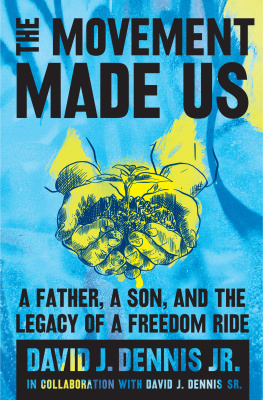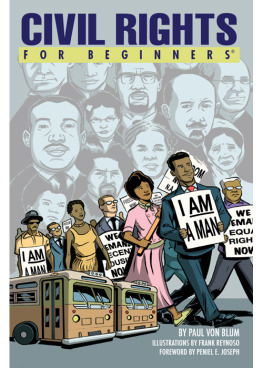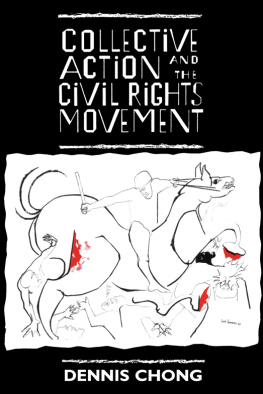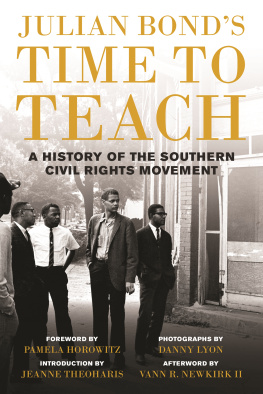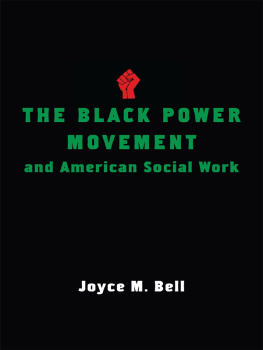Theres a video of James Baldwin interviewing a stranger with my daddys face that will one day be my face.
The VHS tape of this interview has been in my family for forty years. The cassette itself is blank with the exception of a half-faded sticker on it that reads James Baldwin Interviews Civil Rights Workers (1981). Baldwin himself gave it to my dad, who doesnt recall ever watching it. The tape stayed at my mothers house after the divorce, collecting dust until I started researching my fathers life a few years ago. When my mother gave me the video, she told me that shed shown it to me when I was a child and I kind of remembered that without remembering the specifics.
The interview with Dad comes toward the end. The man whose face appears on the screen above the grainy words David Dennis, CORE Activist is my father, but not the one who figures in my memories from childhood. The man in the video with my daddys face was scowling, the lines around his eyes red, his fingers pressed against his temples, and the skin around his jaw drooping. As he talks about the 1964 Freedom Summer and the murders of his friends and the way the search for their remains uncovered more mutilated, decapitated, desecrated bodies of long-forgotten and nameless Black Mississippians, his nostrils flare and he looks like he wants to set the world on fire. So many of my favorite times spent with Dad were day trips traveling through Mississippi, watching him deliver speeches at various memorials, anniversaries, celebrations, and funerals. Ive sat in rooms while he was being interviewed for documentaries. Id seen him mourn his friends, cry over them, share his guilt and regrets. Ive seen him sad. Ive seen him angry. But Id never seen him look like he did sitting across the room from James Baldwin.
I was raised by Dave Dennis Sr., the Civil Rights veteran. The man who spoke about his demons on those trips. The man who worked tirelessly with Bob Moses to reignite their Movement throughout my childhood. That was the man I admired even as he became a father I deserved more from. Id thought that the Dave Dennis behind podiums with his fingers to the sky and crying freedom for our future was the man who emerged from the Movement. The Baldwin tape tells a different history and answers a question I never asked.
In this grainy video, the stranger Dad is lost in his own fury. When he talks to Baldwin, all thats left is a hardness. A calloused, impenetrable husk.
The video is one of the only interviews my dad had done from the end of Freedom Summer up until the 1990s, when I was a kid. Hed wrapped himself in a cocoon of survivors guilt and regret to the point that he would refuse interviews and try to hide from any spotlight his heroism brought. The few interviews he did in the 1980s were combative, short, and full of inaccuracies that come from him simply not giving enough of a damn to care about his answers. The one exception is the interview he did for Eyes on the Prize in 1985five months before my birthbut even that interview was distant and only done because one of the people working on it, Judy Richardson, had been a SNCC worker and, after multiple attempts, finally convinced him to participate in the documentary.
When I ask my dad about that man talking to Baldwin he tells me about his period of insanity. The vaguely detailed lost 1970s and 80s spent running from ghosts, diving in and out of financial despair, drugs, a ruined marriage to the woman who survived the Movement with him, a move to Lafayette in southwest Louisiana, a marriage to my mother and my birth when he was forty-five years old. The years that more resembled those of a soldier returning from Vietnam than a hero of American democracy collecting praise as a foundational member of the Movement for Civil Rights.
My dad was on the way to another catastrophic collapse in the late 1980s when hed gotten a call from Bob Moses. The two hadnt spoken since the 1960s, when they presided over the Council of Federated Organizations (COFO) together and spearheaded the 1964 Freedom Summer. The distance wasnt out of any sort of animus, but because they both needed so completely to flee the Movement and anyone associated with it. Bob had gone to Tanzania to start a family and teach math. My dad hid within himself.
Bob had a vision for a new Movement, one built on erasing the educational gap. One built around math literacy and Black kids. It was an invitation for my father to return to what he and Bob saw as unfinished business. To right the wrongs they felt they had left unfixed. The prospect invigorated my father as much as it terrified him. Bob, or Uncle Bob, as Id come to know him, was persistent.
Finally, one day in 1992, my dad was driving through the Mississippi Delta after a meeting with Bob, whose pitches were wearing him down. It had been Dads first time in Ruleville, the home of Fannie Lou Hamer, since the 60s. It was on that drive that Mrs. Hamer, who had been dead for fifteen years, spoke to him. Dad pushed on the gas, but it was too late. She was in the car. In the back seat. Playing on the radio. In the rearview mirror. Why you leave us, Dave? Where you been? You know better than that. We needed you in here. These kids out here aint no better off than we were and you running? You couldnt even come tell me goodbye, at least do something for these babies.
Dad stopped in Jacksonhis home base during the Movementfor a few days. Then he came home and told everyone we were moving to Mississippi. Dad was taking on Bobs charge to help lead the Algebra Project. He was rejoining the Movement. I was six years old when all this happened. I didnt know the full story. I just remember one day he came home and it felt as if the next day we were moving.
My dad is explaining the story behind our move on a Zoom call, which is how we have to communicate during a pandemic mismanaged by a white supremacist president. Our plans to talk face-to-face had been derailed, but we were committed to finally talking through our lives: me to talk about what it was like being his son and him to explain to me why he was the father he was.
So, all those trips we took to all of those speeches when I was a kid. Those were the first times you were going through and revisiting those places?
Yeah, I guess so. It all feels so heavy. Id always assumed that by the time Id been gone on those trips with him to talk about his ghosts, hed been decades-deep in reckoning and coping. I thought he was smoothing over closed wounds. I never realized he was opening them anew. I was being raised by a man who was facing demons for the first time. This changes everything I thought I knew about my life. Everything about us and what made us.
So my whole childhood was shaped by you returning to the Movement for the first time in thirty years? I lean back in my chair and look to the ceiling. I feel like its about to fall on me. Jesus, you were fifty years old.
Going back to Mississippi saved my life. Im an organizer at heart and thats my calling. It really is. Thats what Im good at. Being there for my people, finishing what we started there. I was myself again. I was back in my groove. I was finally happy.
I want to scream. Dad, you know those years were horrible for me, right?
My dad spent the 1960s willing to sacrifice his life. He spent the 90s willing to sacrifice his family. Our relationship was a casualty of his crusade, my mother coming home from work, holding our family together with duct tape, weary smiles, and promises that Dad would be here if he could. Dad was always travelingthe Delta, McComb, Chicago, New Englandanywhere but with me. He treated our home like a Freedom House where the friends he reunited with stayed almost every nightme giving up my room and sleeping on our couch all through elementary school, never knowing who was coming or going. I loved these people, but all I really wanted was my dad.

